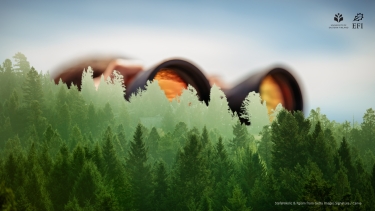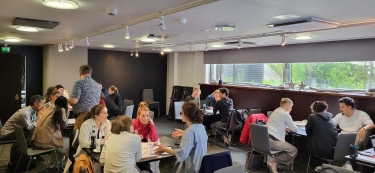Bioeconomy co-operation with China is an opportunity for North Karelia

The region of North Karelia, Finland, has a strong forest-based bioeconomy sector as a result of many years of determined work. A new report by researchers from the European Forest Institute and Natural Resources Institute Finland describes the region’s opportunities for increasing co-operation in forest-based bioeconomy with China. The forest-based bioeconomy sectors covered in this report include wood products, non-wood forest products (NWFPs), and nature-based tourism (NBT). Moreover, this report presents two future scenarios for bioeconomy development in North Karelia.
China has ambitious plans to green its economy and to reach its climate targets. The collaboration with China in forest bioeconomy development has not been systematic in North Karelia. Most North Karelian wood products companies are small and have challenges in establishing export businesses with China. NWFP’s have been exported to the growing markets in China, but mostly as raw materials or primary processed products. The nature-based tourism sector is strongly affected by COVID-19 pandemic but recovery is expected in the future. North Karelia as a region has a lot to offer for tourists looking for sustainable nature-based experiences.
The report indicates that in all three of the studied bioeconomy sectors there are untapped potentials in North Karelian forest-based bioeconomy to grow with increasing co-operation with China. New value-adding products and services may be identified to meet the needs of Chinese consumers and business collaborators. For wood-based products, the new possibilities mostly relate to re-organizing the export product structure from primary products towards further processed ones, as well as incorporating services with the export products. For NWFPs, export potentials were identified in North Karelian chaga and reishi mushroom products and further processed goods. In terms of NBT sector, North Karelia can offer unique, sustainable, and high-quality NBT experiences for Chinese niche markets. This includes professional and educational tourism.
The report emphasizes that North Karelian companies should re-organise and tighten their internal networks and enhance co-operation by integrating different sectors to meet the demand, to develop new products and services, and to carry out joint marketing in China. Finnish sauna, an esteemed Finnish brand with a rapidly increasing market demand in China, was identified as a concept worth further developing in North Karelia. The desired future scenario suggests that growing businesses would bring hundreds of new jobs and hundreds of millions of euros turnover in North Karelia annually. However, several barriers need to be overcome. Current products with low production volumes are suitable to niche markets, but identifying these markets, creating and fostering the mandatory contacts, and establishing viable businesses requires long-term and systematic work.
North Karelia has huge capacity in forest-based circular bioeconomy. Systematic branding can transform North Karelia into an international knowledge hub for businesses and academia related to different forest bioeconomy sectors. This could attract students and businesses from all over the world, including China, to North Karelia. Enhanced research and education collaboration could trigger and support market co-operation. This will not only have beneficial impacts on the regional economy in North Karelia but can even have positive impacts on the global sustainability of the bioeconomy sector. Most countries face similar environmental issues and countries can learn from each other by knowledge sharing on sustainable solutions. North Karelian forest-based bioeconomy expertise can still increase its global footprint in improving the sustainable use of natural resources.
The report Developing forest-based bioeconomy in the Region of North Karelia, Finland: Opportunities in co-operation with China is published by the Natural Resources Institute Finland in its Natural resources and bioeconomy studies series.
Download the report here.
Recommended citation:
den Herder, M., Wallius, V., Konu, H., Heräjärvi, H., Viitanen, J., Mutanen, A., Kurttila, M. & Chen, X. 2022. Developing forest-based bioeconomy in the Region of North Karelia, Finland: Opportunities in co-operation with China. Natural resources and bioeconomy studies 8/2022. Natural Resources Institute Finland. Helsinki. 55 p.
Photo by Michael den Herder


